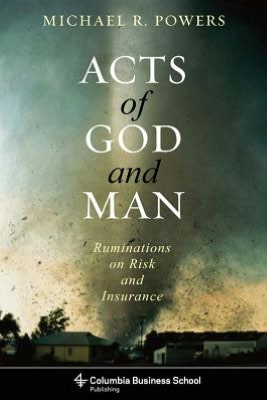Do you want to read an entertaining book about risk and insurance?? Right, I know that it is not likely that anyone could do that, but this book succeeds at the the task.? How does it do that?
1) It approaches the topic without using a lot of math.
2) It introduces you to the practical problems that anyone would face in trying to insure against any catastrophe.
3) It offers an entertaining story at the end of each chapter, some of which build off of prior stories.? The stories have farfetched elements to them, but they illustrate the main points that the chapter has made, while making you laugh.
The author gives no hints to his views on religion, but uses the concept of “acts of God,” to describe events which are out of our control, and thus need risk pooling (insurance), to contrast with “acts of man,” which potentially are controllable, though often not practical to do so.? Insurance may still have a role there, but there will be many more terms and conditions in the insurance contract.
One dominant theme of the book is how one estimates likelihood in the absence of a large amount of data.? Do you:
a) take what little data you have, and calculate an estimate? or,
b) get expert opinion on the matter, and let the small amount of data modify the experts?
The book takes the second position.? I lean toward the first position, but am not dogmatic about it.
When you are done reading this book, you will likely have skepticism toward much economic, sociological, and biometric research, because their foundations are very weak.? Estimates made are not from repeatable processes.
This is a good book.? It takes some effort to read, because the concepts are dense, but the structure of the book lightens things up.
Quibbles
Math error on page 89 — 1.5 should be 1.25.
Who would benefit from this book: Those who want to understand insurance, probability, or research better would benefit from this book.? If you want to, you can buy it here: Acts of God and Man: Ruminations on Risk and Insurance (Columbia Business School Publishing).
Full disclosure: The publisher asked if I wanted the book.? I said ?yes? and he sent it to me.
If you enter Amazon through my site, and you buy anything, I get a small commission.? This is my main source of blog revenue.? I prefer this to a ?tip jar? because I want you to get something you want, rather than merely giving me a tip.? Book reviews take time, particularly with the reading, which most book reviewers don?t do in full, and I typically do. (When I don?t, I mention that I scanned the book.? Also, I never use the data that the PR flacks send out.)
Most people buying at Amazon do not enter via a referring website.? Thus Amazon builds an extra 1-3% into the prices to all buyers to compensate for the commissions given to the minority that come through referring sites.? Whether you buy at Amazon directly or enter via my site, your prices don?t change.

